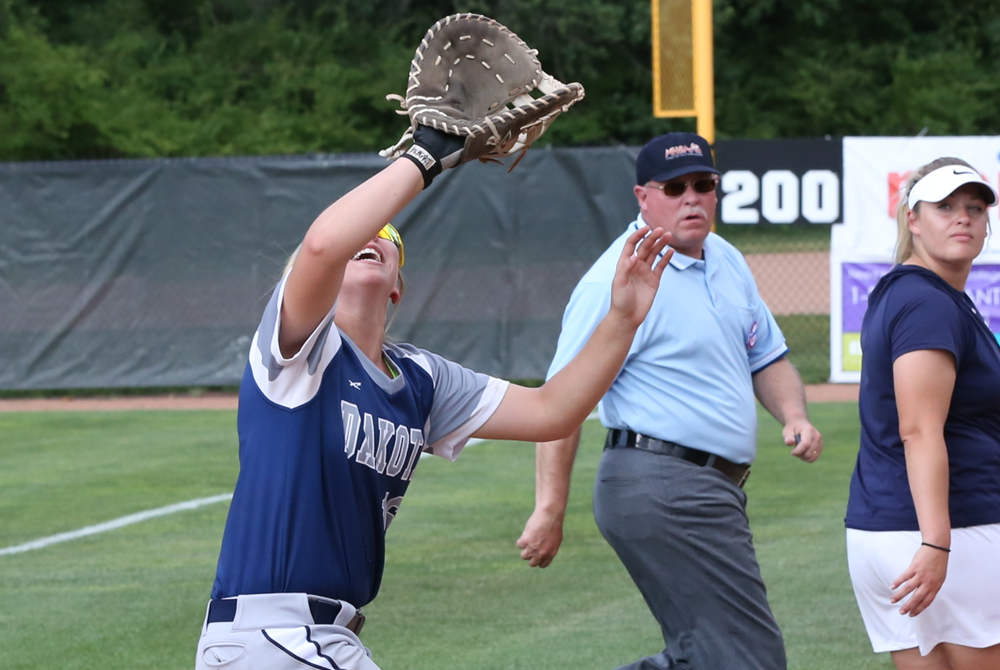
Be the Referee: Fair or Foul Ball?
May 14, 2015
This week, MHSAA assistant director Mark Uyl explains how baselines come into play when deciding if a batted ball is fair or foul in baseball and softball.
Be The Referee is a series of short messages designed to help educate people on the rules of different sports, to help them better understand the art of officiating, and to recruit officials.
Below is this week's segment - Fair or Foul Ball? - Listen
Today’s segment is going to start with a quick “You Make The Call” question.
Baseball batter up at bat hits a line drive directly back toward the pitcher’s mound. The ball hits off the pitching rubber or the pitching plate, and rebounds directly into the first base dugout.
Fair or Foul Ball?
Baseball and Softball are unique in that these are two sports where the lines are actually considered to be in play. A ball hitting the chalk line in Baseball or Softball is a Fair Ball, to where in a basketball game, that player would be considered out of bounds.
Now back to our question – that would be considered a Foul Ball because the ball never settled or passed first base or third base in fair territory.
Past editions
May 4 - Non-Glare Helmets - Listen
April 27 - Vern L. Norris Award - Listen
March 23 - Deciding the Game - Listen
March 16 - Block/Charge Call - Listen
March 9 - Dive on the Floor - Listen
March 2 - Primary Areas - Listen
Feb. 23 - Too Much TV - Listen
Feb. 16 - Video Clip Library - Listen
Feb. 9 - Cheer Safety - Listen
Feb. 2 - Basketball PA Announcers - Listen
Jan. 26 - Wrestling Health Concerns - Listen
Jan. 19 - Basketball Physical Contact - Listen
Jan. 12 - Video Review Part 2 - Listen
Dec. 29 - Video Review Part 1 - Listen
Dec. 17 - Registration Part 2 - Listen
Dec. 10 - Registration Part 1 - Listen
Dec. 3 - Legacy Program - Listen
Nov. 26 - Sideline Management - Listen
Nov. 19 - 7-Person Mechanics - Listen
Nov. 12 - Blocking Below the Waist - Listen
Nov. 5 - Tournament Selection - Listen
Oct. 29 - Uncatchable Pass - Listen
Oct. 22 - Preparation for Officials - Listen
Oct. 15 - Automatic First Downs - Listen
Oct. 8 - Officials & Injuries - Listen
Oct. 1 - Overtime - Listen
Sept. 25 - Field Goals - Listen
Sept. 18 - Tackle Box - Listen
Sept. 11 - Pass Interference - Listen
Aug. 25 - Targeting - Listen

Be the Referee: Softball Base Runner Interference
By
Paige Winne
MHSAA Marketing & Social Media Coordinator
April 23, 2024
Be The Referee is a series of short messages designed to help educate people on the rules of different sports, to help them better understand the art of officiating, and to recruit officials.
Below is this week's segment – Softball Interference - Listen
We’re on the softball diamond today, and we’ve got runners on the corners with one out. The batter hits a pop-up in foul territory near the first base line. The runner on first interferes with the first baseplayer attempting to make the catch. What’s the call?
- If the pop-up is caught, both the batter and runner on first are out?
- The batter is out and the runner on first stays at first?
- The ball is ruled dead immediately, the runner on first is out and it’s a foul ball to the batter?
- Or, if the pop-up is caught, the batter is out and interference is ignored?
If you said it’s an immediate dead ball – you are correct. The runner on first is ruled out for interference and the batter is charged with a foul ball.
Previous Editions
April 16: Soccer Red Card - Listen
April 9: Batted Baseball Hits Runner - Listen
March 12: Basketball Replay - Listen
March 5: Hockey Officials - Listen
Feb. 27: Less Than 5 - Listen
Feb. 20: Air Ball - Listen
Feb. 13: Hockey Penalties - Listen
Jan. 30: Wrestling Tiebreakers - Listen
Jan. 23: Wrestling Technology - Listen
Jan. 9: 3 Seconds - Listen
Dec. 19: Unsuspecting Hockey Hits - Listen
Dec. 12: No More One-And-Ones - Listen
Nov. 21: Football Finals Replay - Listen
Nov. 14: Volleyball Unplayable Areas - Listen
Nov. 7: Pass/Kick Off Crossbar - Listen
Oct. 31: Cross Country Interference - Listen
Oct. 24: Soccer Overtime - Listen
Oct. 17: Tennis Spin - Listen
Oct. 10: Blocked Kick - Listen
Oct. 3: Volleyball Double & Lift - Listen
Sept. 26: Registration Process - Listen
Sept. 20: Animal Interference - Listen
Sept. 13: Feet Rule on Soccer Throw-In - Listen
Sept. 6: Volleyball Jewelry - Listen
Aug. 30: Football Rules Similarities - Listen
Aug. 23: Football Rules Differences - Listen

